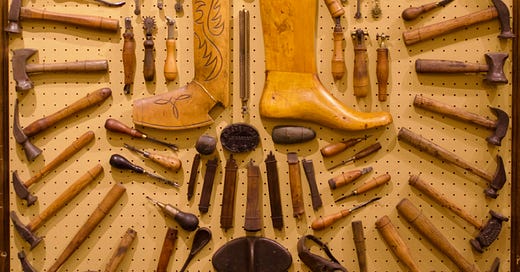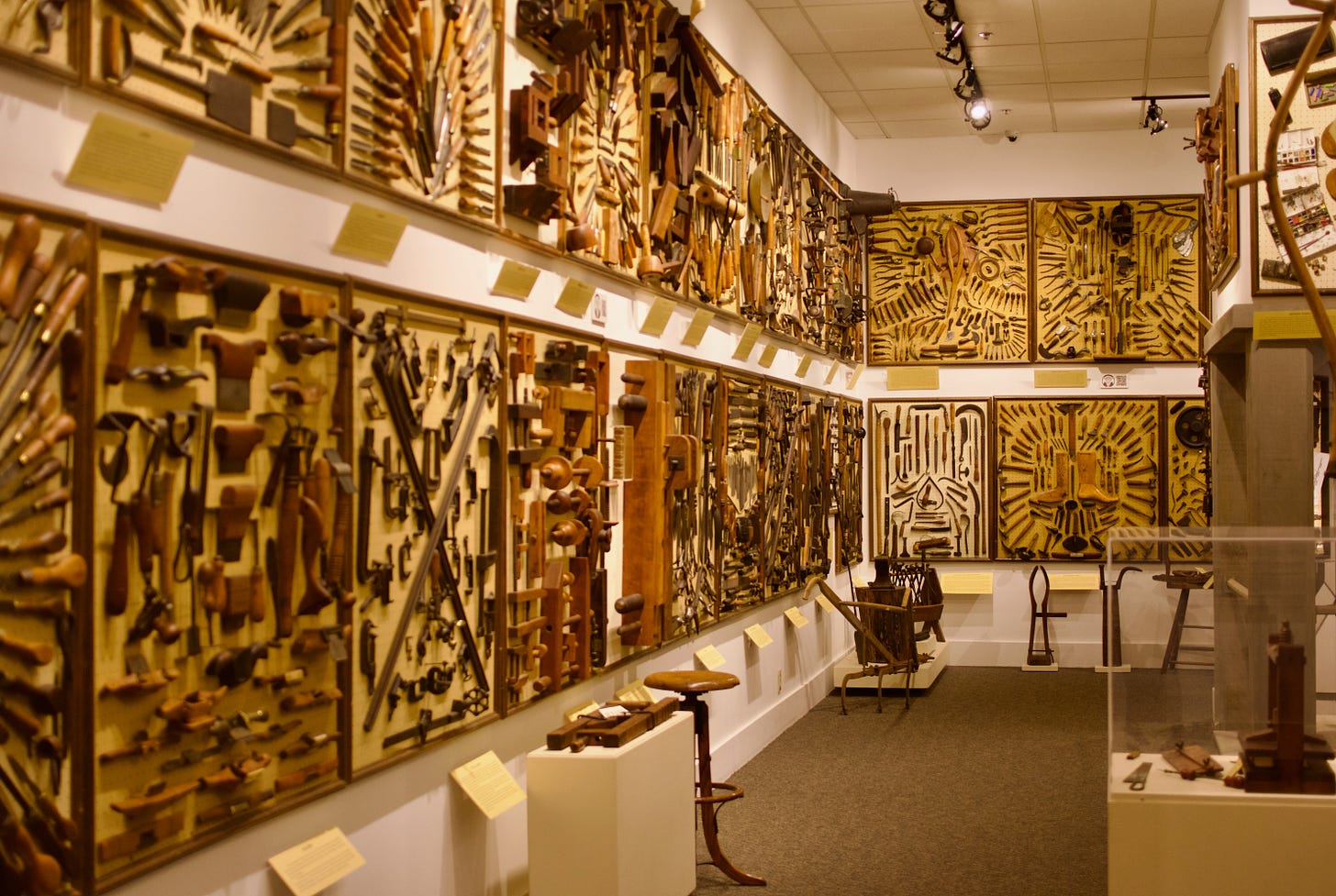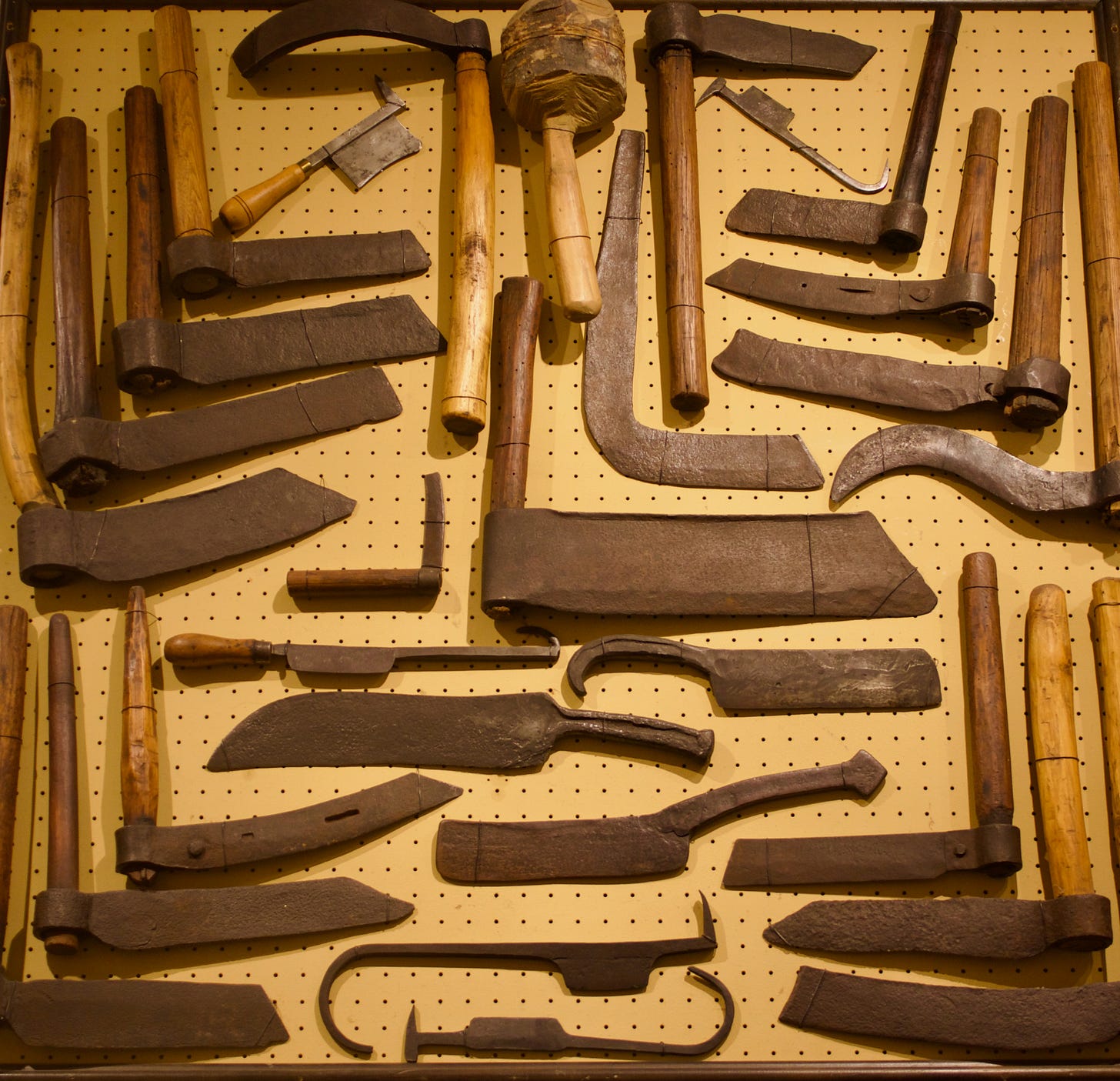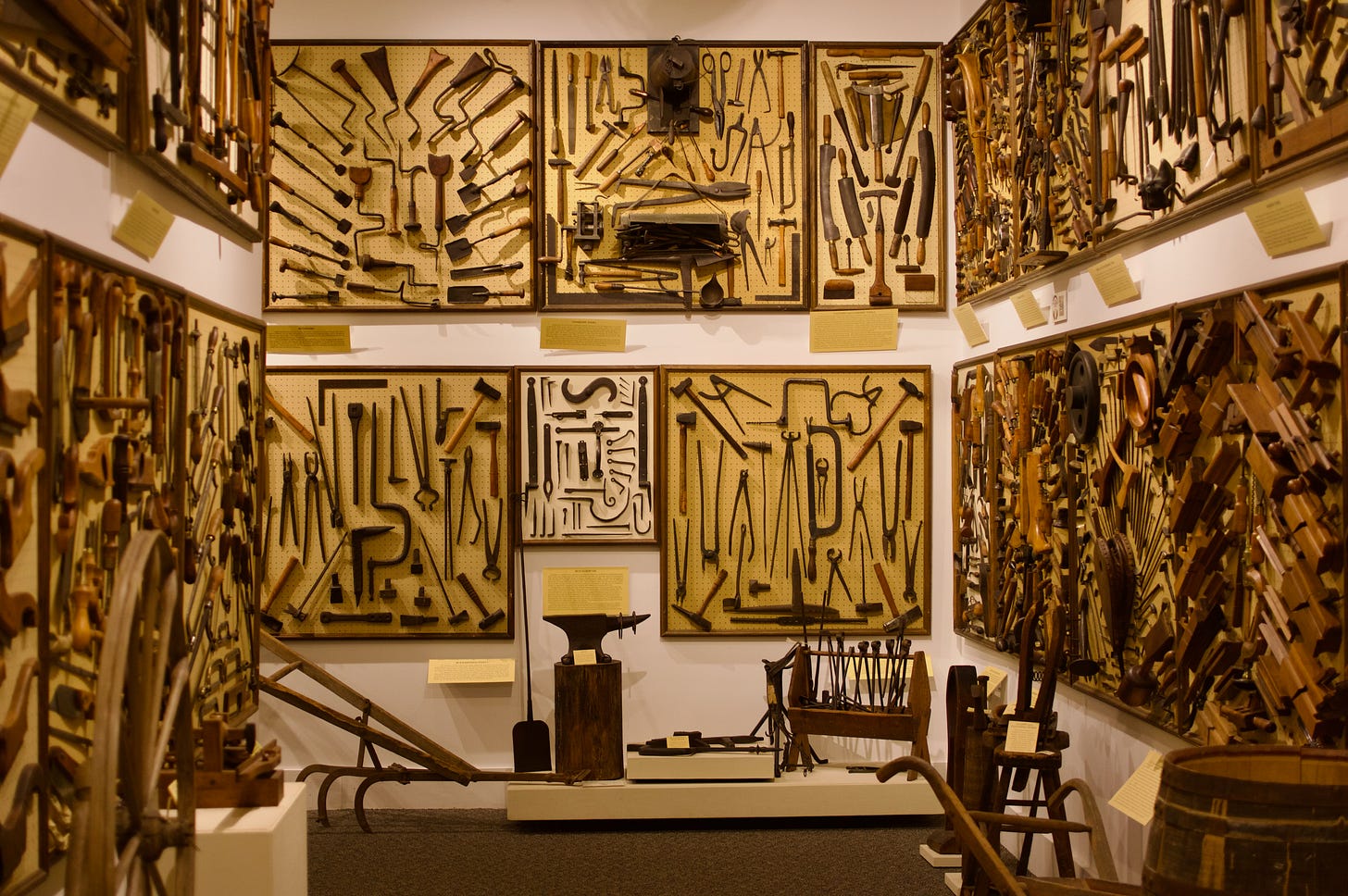This post is dedicated to my friend Kimberly Coburn—maker and writer. She is at work on a book that explores why craft and handiwork are so important to human beings.
In the early 1950s Louise Sellars and her husband Joseph Alan opened a hardware store with a gift shop attached in Atlanta, Georgia. On weekends they began traveling and visiting antique stores to furnish the gift shop. Alan took a special interest in tools, and his collection grew into the thousands. Most were stored in boxes.
A trip to Connecticut changed that. The Sellars went to visit their friend Eric Sloane, an artist and author who collected Americana. Eric’s tools had found a new home in a museum, and he took the Sellars to see it. When Alan Sellars returned to Atlanta, he decided that he too wanted to create a tool display.
He began to build panels for arranging the tools, except he had no display space. He solved that by hanging the panels from the ceiling of the hardware store, above the merchandise. To view them, one looked upward. After a while over 120 panels were on display.
Here’s what one panel looks like. It’s about 4 feet by 4 feet.
Upon Alan’s death, Louise donated the tools to the Funk Heritage Center of Reinhardt University in Waleska, Georgia. Here’s a view of the collection. You can see the panel of shoemaker tools at the far end.
I was lucky to see the incredible exhibit. The tools are mesmerizing, gripping really, reminiscent of a different time, and very artfully arranged. Also nostalgic and sad.
A person can learn a lot about the history and probably the future of humanity by looking at tools.
That’s because we used to make everything by hand, without the assistance of machines or factories or 3-D copiers. Everything. Every button, every cask, every bowl, every spoon. And we may be again.
Defining “Tool”
Humans are a tool-using species. We’re not the only one, but we’ve become extraordinarily good at it.
For me a tool is not only a thing used by hand to create an object. It’s anything we use that helps us do a job more efficiently or quickly or elegantly. A fork is a tool. Most of this exhibit focused on craft tools.
My Favorite Tool
Once I responded to a writing prompt that asked about my favorite tool, and I chose binoculars. Getting close to something without physically approaching is a phenomenal ability. My binoculars let me see birds as if I were holding them in front of my face. I can breathe the feathers. Yes, I’d be hard-pressed to think of a tool more fine than a pair of binoculars.
I really love garden tools as well. I have my own set of car tools weighting down an old metal toolbox. I am especially enamored with tiny tools, such as crescent wrenches four inches long.
What We Will Need
In A House of Branches I include a long poem called “Future-Seeking.” It’s about the coming apocalypse of climate disaster, and in it I talk about the hope chest we’re going to need.
I am filling my hope chest.
In it I have
a rake, a hoe, an adze, a froe,
shovel, hammer, a curved knife…
The list goes on and at the end of it I ask this question:
Can you think of anything else I might need?
The Lexicon
Walking through the show, studying it, was like moving through a list poem. The exhibit started with axes.
axes, hatchets, adzes, bowlmaker’s adzes, froes, planes, double-edged rabbit plane,
metal drills and braces, augers, gimlets, metal braces and bits, drawknives, awls,
mallets, hammers, reaping and trimming knives, mitre jacks, screwdrivers,
inshaves, scoops, spokeshaves, dividers, spirit levels, measuring devices,
chisels, scrapers, gouges, gauges, squares, plumb squares, radial squares, rules, compasses, scissors, tweezers, presses, brushes,
plumb bobs, chalklines, reaping knives, trimming knives, shears, calipers, molds,
handsaws, dovetail saws, stair saws, hacksaws, frame saws, back saws, piercing saws, saw sharpeners, whetstones, wrenches.
Crafting
As I walked around I wrote names for types of craftspeople, and I want to leave you with a list of some of the professions represented by the Sellars exhibit. (Drop others in the comments, and I’ll add them to the list.)
watch and clockmakers
hatters
brushmakers
woodsmen
wheelwrights
bookbinders
farriers
bowlmakers
shipwrights
ropemakers
sailmakers
riggers
turpentine gatherers
farmers
framers
carpenters
roofers
saddlemakers
luthiers
organ tuners
draftsmen
basketmakers
veneerers
handlemakers
vets
coopers
sashmakers
spinners
weavers
potters
moonshiners
masons
moulders
shoemakers
tanners
curriers
tinsmiths
leatherworkers
quilters
doctors
nurses
druggists
locksmiths
Question
What’s your favorite tool?
Writing Prompt
One tool I know well is…















Beautiful.
I had rare wool sheep for a time, up until last year. Wool in the south. I started with electric shears, but they were so noisy, attached by a long extension cord, and had a larger learning curve than I wanted while trying to coax an animal to allow me to touch it with those. We chose hand shears. Completely different tool doing the same job. I was able to take my time, and bond with the sheep, snipping, snipping, snipping…the lanolin coating us both. I did it standing with them harnessed to a fence, so I could straddle them. Starting from the back, while one of our three children talked to them and fed them sweet gum or sassafras, I would snip and peel the wool like a blanket, from rear to front. About halfway through, enough wool is removed from the sheep’s barrel-shaped body that they are able to feel the wind once again touch their skin. There is an instant…and it happens every time…. The wind hits the sheep, and the sweaty, lanolin covered human next to her…. And she feels the realization and memory that this is for her benefit. And the sheep takes a deep breath, and the human responds and relaxes too, knowing it’s all down hill from here. You can’t do that with electric shears. Too noisy, too impersonal and fast…like an act of non-love.
Oh Janisse, one again you've struck a cord deep within me. I'd like to add fish scaler and oyster knife to the list. My father gave me my first oyster knife for my fifth birthday, and I inherited his scaler when he died. As a former weaver and spinner, I'd like to add dye pot, spindle, reed hook, and shuttle to the list. Others have said this, but as writers, it bears repeating: pens, particularly fountain pens.